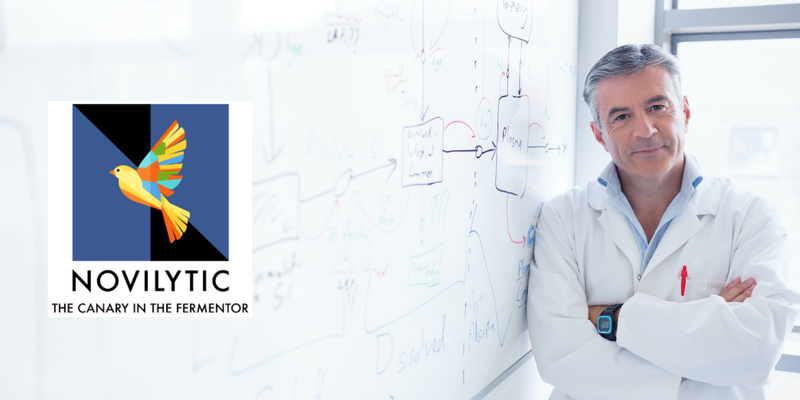I first met Paul several years ago at an Innovation Showcase pitch event. We reconnected last year after he’d been named CEO of Novilytic, a biochemistry analytics company that is commercializing technology developed by distinguished Purdue University Professor of Chemistry, Dr. Fred Regnier. When I asked Paul for his elevator pitch, he explained their technology is the “canary in the coal mine” for the pharmaceutical industry as it detects, in near-real-time, potential quality issues during manufacturing. Since a batch of a specific drug costs millions in raw materials, this is a huge issue. I invited Paul to a VisionTech Screening Committee meeting. We were impressed so we invited Paul to present at our July virtual pitch events. Here’s a preview.

BP: Your chief technology officer who developed Novilytic’s technology, Dr. Fred Regnier, is a legend in chemistry and at Purdue. How did you two connect?
PD: You are correct about Dr. Regnier! He started in Purdue’s Chemistry Department in 1968 and has filled many roles ever since. He’s had an incredibly prolific career. Dr. Regnier has been ranked among the Top 20 Analytic Scientists in the world, holds 48 U.S. patents, and his technology has launched multiple startups and successful exits in our target market, the global pharmaceutical industry.
Fred and I were introduced by Dr. Chris Welch, executive director of the Indiana Center for Analytical Science and Engineering (ICASC). Chris and I go back almost 20 years when he was one of my customers at Merck. Fred was looking for someone to take over Novilytic’s technology and grow the company. Chris recommended me for the role given my 30-plus years in building life sciences and medical instrument companies.
BP: Tell me about Novilytic and the unmet need you’re addressing.
PD: Let me start by explaining the market need. Pharmaceutical drugs are produced in batches. In the case of biopharmaceuticals, the batches are produced in bioreactors over a two-week period. These bioreactors “cook” the drug broth much like the fermentors used to make beer. Batch failure happens in all aspects of manufacturing, but it’s particularly devastating when manufacturing a lifesaving drug. Two percent of all batches of drugs end up too contaminated to save. A single lost batch represents a financial loss of up to $20 million in raw materials alone, while the loss to human beneficiaries of that drug is priceless.
The FDA has strict guidelines on continuously monitoring quality during manufacturing; however, zero companies are truly able to adhere to these guidelines. The current method for testing the efficacy of biopharmaceuticals is to take a sample out of the reactor and run a four- to eight-hour test sequence. This happens daily over a minimum of 14 days. Because of inefficient and time-consuming processes, drug makers can’t catch contamination in time.

Novilytic has developed the world’s first technology for at-line molecular structure analysis that alerts the pharmaceutical company in near-real-time if and when a batch of a drug they’re producing needs to be altered or scrapped. We believe that our Proteometer™ is the first true answer to the drug development quality mandates that were laid down by the FDA decades ago and helps avoid of significant financial losses of bad batches.
Even better, our consumable testing kits are used with instruments the pharmaceutical companies already own. We give them the expanded capability of generating near-real-time data that allows them to course correct immediately, thus preventing the need to do exhaustive and very expensive purification and filtering, or in worst-case scenarios, trash the batch.
BP: You have a clever brand story. Tell me about it.
PD: Complex technologies can be difficult to explain, which is why we need clever marketers. Our brand story kind of wrote itself. We like to think our technology is much like the canary used in coal mines to keep people safe. In that case, the canary was exposed to poisonous gasses that can occur deep within mines and stopped singing, which alerted miners to the danger. In our case, we detect the contamination in a pharmaceutical bioreactor, also known as a fermentor. Thus, Novilytic is “The Canary in the Fermentor.” The credit for our canary logo goes to my wife, who is an artist.
BP: I like it! Explain how your Proteometer works. Is it a device? A process?
PD: Actually, the Proteometer is a kit we supply to customers. It consists of a filter-like reactor in combination with a nanoparticle-based reagent. The customer plugs our Proteometer into their existing instrumentation. This enables their instrument to automatically monitor in near-real-time the batch being manufactured. When contamination or bad chemistry occurs, our kit triggers the instrument so the reactor operator can take action.
Think of it like the filter sensor in your home’s HVAC unit. When your filter is dirty, your HVAC system lets you know it’s time to act. It’s the same with pharmaceutical manufacturing; we advise the customer when their drug is dirty.
BP: What are your competitive advantages?
PD: The short answer is near-real-time testing, geared to FDA requirements, and ease of implementation. To elaborate, drug makers have an analytical time window in which they can prevent their very expensive drugs from being contaminated. Novilytic’s patented technology is the only technology that alerts the customer within that analytical time window and prevents very costly quality issues. The customer gets results in minutes rather than six to eight hours required by competing products. This advancement in monitoring meets FDA guidelines. Lastly, our process is automated and does not require manual sample preparation.

BP: Do you have any patent protection?
PD: We have 10 patents protecting both the concept of matter and the methods of our technology. We expect an additional patent to be released next month as all 49 of its claims were accepted by the examiner.
BP: What’s your total addressable market? Are there any secondary markets you might pursue?
PD: We are focusing on one class of drugs first, the human monoclonal antibody (MAB) medicine market, before expanding into others. Here are two examples of monoclonal antibody drug: Humira®, a drug used to treat Crohn’s disease, and Eli Lilly’s Bamlanivimab for COVID-19. The total addressable market for mAb drugs is $930 million a year. Breaking this down, there are more than 250,000 instruments that can use our kits. Drug manufacturers would buy one to ten of our kits annually at a target price of $3,680 per kit. So it adds up quickly.
Within the monoclonal antibody space, there are veterinary medications. That market represents $160 million annually. We can convert our human mAb product to animal health within six months. The ELISA and Western Blot markets are much larger, $2.1 billion each annually that we can potentially address with small modifications to our technology.

BP: What’s your revenue model?
PD: It’s much like a shaving model with ongoing repeat purchases on consumables, the razors. The customers already have the equipment—the handle. Novilytic sells the kits—the razor blades. In this case, we’re supplying a much better razor blade. Customers buy kits that can run from 128 to 1056 tests. When they’re finished with that kit, they purchase another one. As mentioned earlier, some customers will consume up to ten kits a year.
BP: Where are you with commercialization?
PD: We will start pilots with our target customers in August. Based on a two-step pilot model, we will take what we learn from those customers to create our first two to four MVPs. Those products will be launched in February 2023.
BP: What funding round is this?
PD: Seed round. Our target is $1.5 million, and we’re oversubscribed at $1.86 million.
BP: What is your planned use of funds?
PD: Our focus is on hiring people and growth. We plan to hire sales and marketing and support those efforts. We will also do some final product design and quality testing. Overhead represents just five percent of our projected expenses.
BP: Give three reasons why VisionTech Angels should invest?
PD: The Novilytic team is led by very experienced entrepreneurs with multiple successful exits between us. Our technology is well-protected, extremely disruptive, and solves a very real issue for the pharmaceutical industry. Like winning SaaS opportunities, this little canary eliminates the customer’s pain with a very profitable annuity-like business model.

VisionTech Angels’ July Pitch Events will be virtual on Thursday, July 28 at Noon ET and at 6 p.m. ET. Pitch events are open to our members and accredited investors interested in joining our group. To register, check your email for an invitation, go to our Events page where you’ll find the RSVP links, or email Ben Pidgeon at bpidgeon@visiontech-partners.com.
